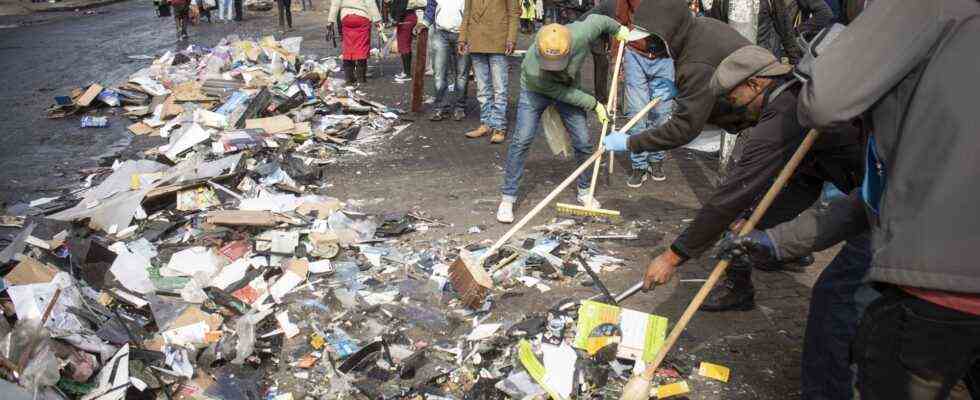Status: 07/18/2021 4:14 p.m.
More than a week after the riots began, the clean-up work began in South Africa. Many in the country are shocked by the extent of the destruction, and the consequences will be felt for a long time to come.
From Jana Genth,
ARD studio Johannesburg
You wouldn’t be South Africans if people didn’t seize the opportunity to sing and dance everywhere. With brooms and plastic bags in hand they have been sweeping in Durban for days and now – on “Mandela Day” – also in Alexandra, a poor neighborhood in Johannesburg.
The whole city helps with cleaning
Lincoln Ngwenya lives in Alexandra and he is amazed because people from all residential areas in Johannesburg come to help. “It’s not about skin color, everyone is here helping and sweeping, old and young, that’s really good,” he says.
The whole thing happens under the protection of the military. Soldiers patrol Alexandra, and even the commander-in-chief of the South African Army SANDF, Rudzani Maphwanya, came by. “We continue to protect our people. We do not tolerate any form of lawlessness,” he said.
The soldiers are also stationed around Durban, they protect important places. They also ensure that traffic on the N3 motorway, an important logistics artery between Durban and Johannesburg, is back on its feet. Hopefully this will bring some relaxation, because there are still long queues in front of the supermarkets in Durban that have not been destroyed. “It’s bad, I hardly have anything to eat at home,” says one woman. “But the burning buildings were worse, that scared me.” All of the computers in her company were stolen and everything was damaged there, she says. “I don’t know if I still have work either.”
More than 200 deaths
The damage after the unrest still cannot be quantified; it is estimated at several billion rand. Whole cities have been set back years in their development, suggest several mayors. And many shopkeepers are resigned. “They took everything with them, every little part,” says one owner. “How can you plunder? That concerns jobs, that is the bread for our children. We are the ones who suffer. That is traumatic.”
More than 200 fatalities during the troubled days are a sad result. The angry crowd that stormed into the shopping malls has also stoked fears in Alexandra – even with a hairdresser whose shop is still intact. “It wasn’t easy, you can see the guns, the police are outside, I’m afraid,” she says. “When people come in here, I’m scared too. If I see them, I think they might attack us.”
Private vigilante groups in the neighborhoods
Many people have formed their own vigilante groups to protect their neighborhoods. They now work in shifts day and night. Donations are being collected across the country for the hard-hit Durban.
Imtiaz Sooliman, head of the “Gift of the Givers” aid organization, still cannot understand what happened. “The sad thing is: your family, your children, your grandchildren and great-grandchildren, they pay the price for your wrongdoing,” he says. “The people who looted: How long will their food last, four to five days? And to put it bluntly: Many black people were involved. And who do they harm? Black people.”
“Don’t let our country burn”
The fact that the majority of the black population in South Africa is poor explains the abuses. You can currently see emotional videos of them on social networks. Jeepy, for example, tearfully says: “My brothers and sisters in South Africa, stop what you are doing! Don’t let our country burn!”
You can hear it: the shock is deep, even now. South Africa will feel the effects of this week for a long time to come.
The aftermath of chaos: South Africa is licking its wounds after the riots
Jana Genth, ARD Johannesburg, July 18, 2021 3:17 p.m.

